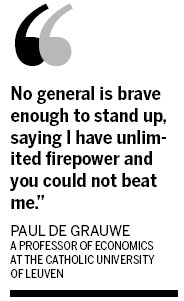Professor: Central bank should act as 'general'
Updated: 2012-01-20 07:28
By Fu Jing (China Daily)
|
|||||||||||
ECB urged to take bold steps to stabilize volatile bond markets
BRUSSELS - A prominent economics professor has called on the European Central Bank (ECB) to act as a general equipped with "unlimited firepower" as it tries to help members of the eurozone win their battles against vicious cycles of debt-rating downgrades, bank panics and credit squeezes.
"No general is brave enough to stand up, saying I have unlimited firepower and you could not beat me," said Paul De Grauwe, a professor of economics at the Catholic University of Leuven. He used the metaphor to describe why European Union countries are now unable to extricate themselves from their difficulties.
De Grauwe, also an adviser to Jose Barroso, president of the European Commission, called on the ECB to act as a general.
"It is the last resort of rebuilding confidence among the bond investors and commercial banks."
De Grauwe encouraged the ECB to take the bold step of announcing it "has unlimited firepower" to stabilize the volatile bond markets.
"In this difficult time, the central bank should provide credit and liquidity to enterprises, home buyers and other banks," De Grauwe said. "But the ECB just holds themselves back, fearing the measures could stir up inflation."

The December inflation rate in the eurozone was about 2.7 percent, much lower than in Britain, the United States or China.
De Grauwe said the European Union treaty allows the ECB to buy government bonds from the secondary market but prevents it from financing government deficits through direct monetary injections.
"Once the ECB buys these bonds from the secondary market, it buys from financial institutions, not from the governments.
"This is allowed by the EU treaty," De Grauwe said. "But the problem is that the ECB does not want to use this function due to various reasons."
De Grauwe said the European Union should improve its institutions to achieve not only a stronger monetary union but also political union.
"It is crucial to implement stricter fiscal disciplines, but that is not enough," De Grauwe said. "We should have the system to win the psychological wars in the monetary and bond markets."
He also said the union's rescue fund, the European Financial Stability Facility, "certainly is not perfect"; every country within it, he noted, has veto power.
In the long run, he said, improved institutions will help encourage the EU member states to transfer to the union their sovereignty over taxation and the issuance of bonds.
Regarding De Grauwe's proposal to give the ECB an unlimited monetary means to fight market forces, Duncan Freeman, researcher with the Brussels Institute of Contemporary China Studies, said: "This is a rational approach ... but in the current political circumstances, it is not practical because of opposition, especially from Germany."
David Fouquet, director of the Brussels-based Europe-Asia Research Network, said other solutions should be sought to overcome the current difficulties, such as using the International Monetary Fund and the private banking and investment system, as well as sovereign wealth funds.
"Such means of economic and financial governance should be exercised at all levels from the local or municipal, to national, regional and global dimensions, with intense coordination between all," Fouquet said.
Fouquet said it is also imperative over the long run to rethink and redesign the global financial system, which has proved to be flawed.
China Daily
Today's Top News
President Xi confident in recovery from quake
H7N9 update: 104 cases, 21 deaths
Telecom workers restore links
Coal mine blast kills 18 in Jilin
Intl scholarship puts China on the map
More bird flu patients discharged
Gold loses sheen, but still a safe bet
US 'turns blind eye to human rights'
Hot Topics
Lunar probe , China growth forecasts, Emission rules get tougher, China seen through 'colored lens', International board,
Editor's Picks

|

|

|

|

|

|





